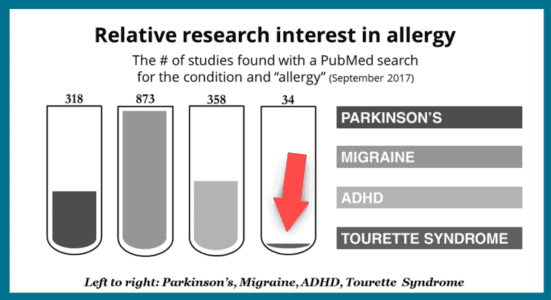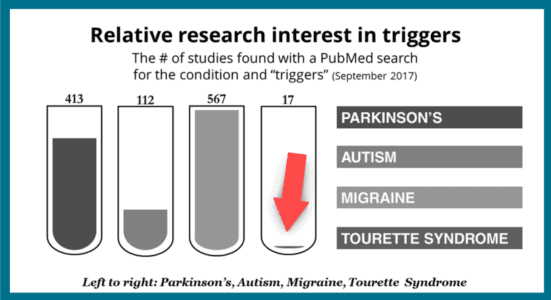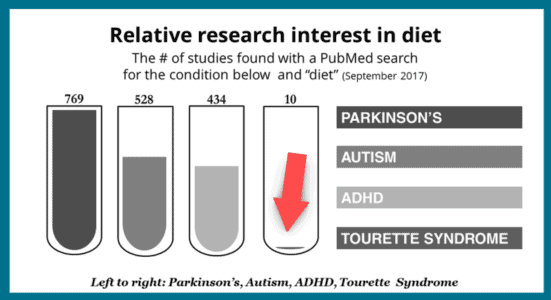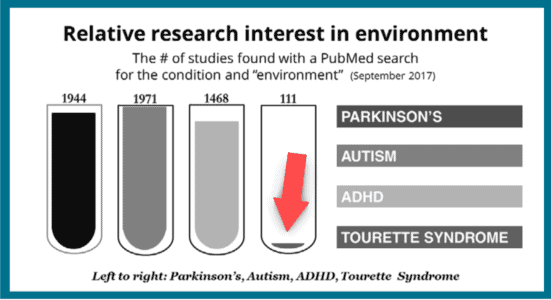Research for Tourette Syndrome Fails Patients and Families

When it comes to new answers, Tourette’s is losing the race
An objective assessment of progress in the field of Tourette syndrome leads to one conclusion: The narrow focus of current research is appalling. The medical community is disengaged and disinterested in the role of critical issues such as diet, allergy, chemical sensitivity, the environment, and other potential links to tics. In contrast, these topics have received considerable attention for related medical conditions.
Millions of dollars have been spent on genetics, drug therapy, behavioral intervention, and brain stimulation (an invasive technique). Yet the Tourette community is desperate for better answers.
Patients and families are dissatisfied with the progress for conventional treatments. That’s why, for several years, my books on natural approaches to Tourette syndrome have been best-sellers on Amazon.
The failure starts with tunnel vision
Our Association for Comprehensive NeuroTherapy (ACN) conducted a survey (2003-2004) that was responded to by nearly 1800 people worldwide. The survey focused on triggers for tics—factors that patients and families observed could start or worsen tics. Well over 30 triggers were reported, from types of foods and food additives to inhalants such as dust, mold, and pollens; bright lights and video games; stimulant medications; chemical odors, viral and bacterial infections; alcohol consumption—to name just some. As in other medical conditions, triggers can vary from person to person. Results were shared with the Tourette Association of America (TAA) which was previously Tourette Syndrome Association (TSA), our newsletters, and featured in our first book Natural Treatments for Tics and Tourette’s.
We assumed our survey would be the first of other large-scale surveys on triggers. Yet, almost 20 years later, there have not been any significant surveys. (I should qualify that: There was a targeted survey by the TSA/TAA several years after ours, but results were withheld from the public. I was told by their scientific liaison that the medical board thought the survey findings might “confuse people.”)
While speaking at the Atlanta Tourette Conference in 2016, I collected feedback on triggers for tics from the audience. Click to see.
The absence of comprehensive surveys addressing Tourette’s, tics, and triggers is conspicuous by its absence. Surveys are a low-cost, revealing approach used in many medical fields. In my latest book, Tourette Syndrome: Stop Your Tics by Learning What Triggers Them, I compare research “interest” for Tourette’s and allergy, triggers, and diet with interest shown for other medical conditions. The PubMed database of published research was searched for these details.
The numbers presented in the charts are higher than actual studies published on the topic. For example, there are only a few, not 10, published studies on Tourette syndrome and diet. The numbers in the charts reflect not only published studies on the topic but also related research generated by a search. A comparison of these numbers gives the reader a sense of the trends.
The charts demonstrate a major lack of interest by Tourette syndrome researchers in key areas that could yield new answers and greatly improve patient care.
The scientific community for Tourette’s exhibits an indefensible lack of open-mindedness. They fail to collaborate with integrative physicians or medical and scientific experts outside their narrow disciplines. Further, they do not properly survey those dealing with Tourette syndrome to learn from their experiences. As a result, most researchers lack a basic understanding of how these factors can affect the nervous system.
NOTE: There is not a direct one-to-one comparison for each element of these charts. For example, there is currently a greater incidence of autism and ADHD than Tourette’s.
Conversely, many more people have a diagnosis of Tourette syndrome (1 per 100) than have Parkinson’s disease (3 per 1,000). Yet, Parkinson’s research has seen a much greater focus on diverse factors including allergy, diet, the environment, and triggers than has Tourette syndrome research.
The comparison with migraine is a special situation. There is a fourfold increase in the incidence of headaches and migraine among children and adolescents with Tourette’s. Even though migraine is more common than Tourette syndrome, given the “migraine-Tourette connection” we should be vigorously exploring some of the same research areas for tics as occur for migraine.
Clearly, research on Tourette’s for the topics highlighted in these charts is negligible. The tic community should ask: What excuse could there be for this?
These graphs were developed four years ago. After checking PubMed for current stats, I can confirm that the relative profile remains sadly accurate.



Ignoring the role of the “environment” in tics is unethical
The standard advice to Tourette syndrome sufferers is: “It’s a genetic condition. Tics will come and go; there’s nothing you can do about them.” Patients and families hear this so often that it colors their observations and disempowers them—they don’t even think to look for what might be triggering tics.
Yet, it has been established that Tourette’s is not just genetically based. It is also an environmental condition. This is a documented medical fact that is rarely discussed.
When the environment is a factor in a medical condition, lifestyle, diet, medications, physical imbalances, sensory influences, infections, allergies, and exposure to toxins all have the potential to affect symptoms.
It is commonsense for research to go beyond genetics and focus on environmental issues. The chart below makes it clear that leaders in the field of Parkinson’s, autism, and ADHD agree on the importance of exploring environmental influences. The Tourette syndrome scientific community would rather ignore the subject.

Why is research for Tourette’s so constipated and inadequate?
Countless families and patients have reported a connection between tic symptoms and a range of environmental factors. Why are they being ignored? I propose it’s because the topics fall outside the mindset of conventional neurology, psychiatry, psychology, and behavioral therapy. You see, these are the main medical disciplines represented on the Scientific Advisory Board for the major national organization, Tourette Association of America. See for yourself.
The Scientific Advisory Board for the Tourette Association of America excludes experts in immunotherapy/allergy, nutritional therapy, chemical sensitivity, and environmental medicine.
The ongoing failure of the Tourette Association of America to expand its scope of expertise makes us question their motives. In fact, we have suggested that this group be investigated for stonewalling and blocking information that could change the direction of future research. Since they cannot be trusted to take the lead in this effort, other organizations and funders will need to step up to accomplish this vital work.
Collaboration with world-class specialists in diverse medical areas would yield valuable answers and be of great benefit to the Tourette syndrome community. It’s time for this field to forge new frontiers.











Thanks for your article. My daughter suffered a sudden, severe onset of tics at age 14. It was completely debilitating and terrifying. I remember driving her home from school one morning (she could not remain in class for the tics) and the only thing holding her in place in the seat next to me was her seat belt. Her tics were so violent I feared she’d hit me and I would lose control of the car.
My daughter was seen by specialists all over Los Angeles: UCLA, Children’s Hospital, Verdugo Hills, behavioral therapists, etc. We were fortunate to have an outstanding pediatric psychiatrist who did everything under the sun to help her–including offering us free treatment when we were unable to keep up with the medical bills.
My daughter was taking so many different medications that she was often unable to stay awake during the day. We finally had to pull her out of school entirely because it was absolute torture for her to be in class.
Over time, her condition improved. Maybe leaving school helped–there may have been allergens on campus. Or perhaps the tics were related to underlying anxiety. We never found out. My daughter suspected it was a dietary issue, and she made significant changes to her diet–becoming entirely vegan at one point.
Today, four years later, the tics are almost all gone. Now and then she will have a minor incidence of tics, often brought on by anxiety, but it’s nothing like it was before. I wish we had been able to offer her more help than was available to us back then.
Thank you for your thoughtful article. I hope your voice will be heard far and wide.
I knew it, it’s like the Autism advocacy group where the head was in the pharmaceutical industry and was lying to parents that vaccines don’t cause Autism
Hi Monica, Thank you for writing. We’ve always had confidence in the work of the Autism Research Institute, founded by Bernard Rimland. Dr. Rimland was on our advisory board until he passed away. The organization continued and still does great work. https://www.autism.org/ They seem to exhibit the type of fair, open-mindedness needed to increase awareness and research forward.
I do believe that vaccines cause autism and also Tourette’s (it’s in the inserts) also the meds that treat Add/ADHD (it’s in the inserts)
Roxanne, I really appreciate your comment about your daughter. I’m so glad she is doing well now. It’s interesting that she herself suspected her diet played a role. Often kids can feel a reaction when they eat certain foods or additives. Sometimes they don’t want to admit it if it’s a favorite food item! Or, sometimes there’s more than one factor at play and it’s challenging to tease it out. It’s great she experimented with her diet. Please give her my regards.
As far as my “voice being heard,” we truly need an investigative journalist to take this issue on. There’s plenty of material for them to focus on. I’ve tried to get the word out for 25+ years. The pharmaceutical companies, along with self-serving medical practitioners/researchers and certain advocacy groups, have a lock on this condition.
It is a shame children suffer symptoms needlessly because the medical community will not listen to parents. Latitudes featured two articles about my son, Eli, a few years back. My son will be a 2022 graduate and I still get emotional when I think about what his world would have been like if it were not for ACN Latitudes and the Feingold Association. Eli’s symptoms started in kindergarten with eye rolls — when I look back I do feel like it was a reaction to vaccines and then environmental factors and diet caused it to escalate.
In first grade he was considerably worse (motor/vocal tics, ADHD type behaviors, night terrors and OCD behaviors) and in February of his first grade year he was diagnosed with Tourette’s. He would have as many as 72 eye/facial tics while reading his first grade story at home and 5 – 6 tics when trying to complete a sentence when talking. He was already improving, because of the Feingold diet, by the time we went to the neurologist for the first time but she told me there was no scientific evidence that diet helped and suggested medication. I told her my evidence was sitting in my lap and that he had improved greatly – we didn’t go back to doctors regarding Tourette’s.
He was fine the first half of second grade but everything was back full force when he returned to school from Christmas break. Over Christmas break the carpet in the classrooms were cleaned, doors closed and heat turned on high for it to dry. The carpet cleaner was a major trigger for Eli. Fortunately, I worked in the school and was able to speak with the principal who worked hard to prevent future triggers and changed the carpet cleaner. Eli did not have any symptoms in third grade.
We were alert to the dangers of chemical exposures now. In fourth grade, ant-killer was sprinkled on the playground beside where he was standing and it triggered tics for about 2 1/2 months. We learned that Pledge furniture polish caused an onset along with other conventional cleaners, and Tamiflu caused a bout with night terrors. When Eli entered middle school the principal allowed me to talk with the teachers. Eli made it through middle school (5th-8th grades) without an issue.
For eight years he drank detox smoothies before going to school and still drinks them often. He has never really been off of the Feingold Diet — he knows what he can and cannot eat–he’s great about reading labels and ingredients. He hasn’t had a vaccine since kindergarten because we simply do not know what it could do to him because of his hypersensitivities. We still monitor his environment and he knows to be aware of what is around him.
It’s been so long since he has had any tics or symptoms we don’t know if he would have a reaction, but we are not willing to try it to find out!! Feingold and a chemical-free environment (suggestions from ACN) have been our life for almost 12 years so it’s just automatic. This coming year Eli will be graduating high school. He is a baseball player, left-handed pitcher, and we have already visited several colleges that have offered him scholarships in baseball. He is a top student, great athlete and lives a perfectly normal life. And to think, we almost pulled him from baseball because of Tourettes…. Thank you Latitudes!!!!!
Tammy, it is so great to hear from you and get this update on Eli. I’ve always remembered your story and the picture of smiling Eli in his baseball uniform. How fantastic that he has offers of baseball scholarships for college! I know this took a lot of effort from you, and discipline from Eli, to make this happen. He did well in school, and it helps when a child is bright enough and willing to make wise decisions on lifestyle. You did all the hard work, and we just put the information out there! And the Feingold Diet has helped many. http://www.feingold.org
I hope everyone will read Eli’s story. It has even more interesting details and will be an eye-opener for some readers. Check it out with the link below. And Tammy, good luck to Eli in selecting the school he thinks will be best for him!
Thank you so much for getting back in touch.
ELI’S STORY
Thank you so much and it’s great hearing from you! The work you do is life changing and our family cannot thank you enough for getting information out over the years and staying persistent. Eli still has a smile that lights up a room and is truly an overcomer. You may not realize it but you had a big role in helping his dreams come true…without your information, he would not be where he is today!!
Tammy, I’m sure Eli will be in big demand as a top-notch left-handed pitcher. Please say hi to him. We’ll keep an eye on his career!
It’s unfortunate that many families are told that their child has tics and there is nothing that they can do about it beyond using drugs or behavior management. My own tics have greatly improved by making some simple dietary changes and by avoiding toxins (fragrances, etc.). Hopefully more research can get funded that focuses on alternative treatment options. Not everyone is the same and some types of treatments will work better for some than others, so it is good to have different options to consider.
It’s so helpful when someone like you who has had first-hand experience with improving their tics with diet and avoidance efforts gives a testimonial about their success. Agreed– we need research funding (soon!) to make progress in alternative treatment options. Thanks for taking the time to respond to this, Alan.
It’s a disgusting shame that after all the years we’ve been shouting from the rooftops that foods and the environment can trigger Tourette symptoms, the powers that be still pay no attention. Maybe the researchers would be more interested if their own child was pounding their chest and screeching like an eagle, like my son did before we discovered what caused it and stopped it.
Abraham Lincoln said, “Let no feeling of discouragement prey upon you, And in the end you are sure to succeed.” That is my prayer for you and your organization.
The people who are suffering from Tourette Syndrome need a champion like you. Stay focused and keep shouting loudly.
g.g.wakem
I love and appreciate the quote from Lincoln — and your prayer, Ginger. That gives me hope.
After the experience you had with your son–when you learned the causes for his severe tics and were able to heal him–I’m sure life was never quite the same. Seeing is believing, and when we know the truth, we want others to know it as well. You paved the way for the success I had in treating my son. So many others have benefited from these same approaches, but the word still needs to be spread, and research is needed. Let’s see if positive change comes soon.
So frustrating when simple and effective methods for treating TS aren’t shared and researched so more people can have access to them. And it’s especially frustrating when the biggest sources of information (like the national Tourette Association) actually steer people AWAY from exploring these treatment options. It leaves so many people and families suffering needlessly and without hope.
That’s probably the biggest frustration of all, Mona–that many are suffering needlessly. While there aren’t answers for everyone yet, simple and effective methods, as you share, could be shared. Families have the right to at least learn what is helping others and they can decide for themselves if they want to try the approaches. This type of effort can go hand in hand with research.
Wow, I’ve never seen the comparison for other medical conditions presented in this way and it’s shocking. This definitely needs to be shared more and brought into the spotlight. The work you’ve been doing for the last 2+ decades has been a true labor of love and has helped so many, but so many more are still looking for answers and deserve better!
Thanks for the support, RW. We tried to make it clear that these areas are terribly neglected!
Thank you for your article and I have also read your book a few years ago. My 12-year old daughter has had facial tics for 4.5 years now (eye rolling, mouth twitching to the side and nostril widening, it happens all the time, every couple of seconds). We try to stay away from certain triggers like sweets or hairspray but we can’t change her diet to remove dairy or carbs because she does not eat such a wide variety of foods that we can pick from. We are going to try hypnosis next. We are hoping it will improve after puberty. She is not interested in doing CBIT, yoga, etc. Do you have any other suggestions of anything we can do to improve her condition? Thank you.
Hi Irene, and let me first apologize for overlooking your comment. The team always reviews them before posting and yours slipped through the cracks!
I’m sorry your daughter is having facial tics as she enters her teen years, after dealing with them for almost 5 years. There are \a number of directions you could look into to hopefully find some answers.
What area do you live in?
And what have you tried so far?
I saw the note on efforts to avoid triggers. What have you noticed seems to be a trigger?
Have you seen an allergist — and do you have allergies in your family?
I hope you will write back. Thank you for being in touch.
Hi Sheila, Thanks for your response. We live in NYC (Queens). We are currently trying Bach flower remedies (just started a few weeks ago so too soon to tell) and have an appointment in a month with a pediatric hypnotherapist whose goal is to teach a child to relax themselves which my daughter does not know how to do. Sugar seems to be the main trigger along with with stress or excitement. We have not seen an allergist, we know that she has non-life threatening allergies to walnuts/pecans (not almonds) and pollen in the spring which seems to make her tics slightly worse in May (I do not give her claritin/allegra as I believe it makes tics worse). We do have some allergies in my family, my husband to pollen and his mom to ragweed and some flowers (I have no allergies), my brother and his kids when they were young to nuts and some other foods. My daughter is an extremely intelligent girl, overachiever by nature and has always been the top student in her class, I believe her desire to be the best is a contributing factor to her condition. Her brain is always working/thinking, she finds ways to occupy herself even when she is not busy with schoolwork. Thank you for taking an interest in helping us. It is greatly appreciated.
Hi Irene, I hope your daughter is doing better. Now that it has been over a month since you started Bach flower remedies, have you noticed any improvement?
If you saw a allergist you might get some guidance on whether she has significant mold, dust, or outdoor allergens that could be helpful in knowing what areas to address It’s interesting that you find claritin and allegra make symptoms worse. Please let us know if you have any updates.
I hope you have been able to eliminate scented products and toxic cleaners in the home.
When sugar is a trigger, as you mention, then in addition to trying to reduce sugars, exploring leaky gut and candida overgrowth can be useful.
I have not noticed any improvement from the Bach flowers. Thanks for all the suggestions. We have never used any scented products or toxic cleaners at home. We will look into candida overgrowth and leaky gut. My daughter does eat a lot of carbs, such as homemade pancakes/waffles for breakfast (4-5 days a week) and whole wheat almond butter sandwich for lunch every day, she also likes cheese and fruit for late night snack (apples, strawberries), but does not eat any refined sugars of any kind such as candy or cookies. It would impossible for me to cut out these foods from her diet as she only eats a limited number of things. Dinners are more flexible as she eats a wider variety of things such as salmon/rice, chicken/mashed potatoes, sautéed vegetables. But lunch is pretty much unchangeable as she takes it to school with her every day. I will write back if there are any updates of course. What I have been trying to research and figure out is the underlying reason for tics as opposed to triggers. In another words, if one were to reduce the triggers, such as sugar, dust or whatever else it may be, will they still have tics just not as pronounced or frequent perhaps? I have been wondering whether the subconscious has anything to do with tics as tics, just like any involuntary movement like blinking, is supposed to be controlled by one’s subconscious. Thanks again.
It’s been a year since my last post and there is no improvement unfortunately to report. The facial tics are about the same and the vocal tic is worse/louder/more pronounced. We will try various supplements now like: Vitamin A, D, P-5P (if her stomach will tolerate), magnesium taurine. Have you seen positive results from these and also from CBIT or is that just suppression of your tics? Thank you.